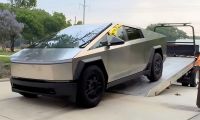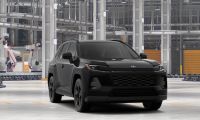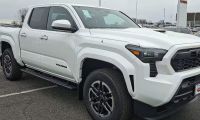Start-up electric car maker Tesla Motors, with total sales volume that's a tiny fraction of GM's volume, might not seem like a big threat to General Motors. At today's TSLA stock price ($181.11) and $22 billion market cap, the stock market is valuing Tesla at nearly one-half GM's $51 billion market cap. On Friday, when GM's CEO Dan Akerson told the Detroit News that GM is planning to take on Tesla with the Cadillac brand, he may be looking nervously at the message the stock market is speaking about the automobile industry.
Last week Tesla's stock price popped from the upper $160's to over $180 a share, following news about plans to deliver autonomous driving features starting in 2016-17, and a major stock analyst raising his TSLA price target to $200 and reiterating a buy recommendation. Over the last six months Tesla's stock price has risen nearly six-fold in an amazingly strong performance. It has risen so high, so fast, that the stock price is clearly not based on a normal valuation based on Tesla's current performance as a company. At this price level, the stock market is either betting Tesla Motors will completely disrupt the automobile industry, or else the company is caught in a hype bubble and will eventually disappoint the investors.
GM CEO Dan Akerson reiterated in an interview with the Detroit News that GM plans to "take on" Tesla Motors, while at the same time downplaying the potential of electric cars and playing up the potential of plug-in hybrids like the Chevy Volt. His plan to take on Tesla is, “If you want to compete head-to-head with Tesla, and we ultimately will, you want to do it with a Cadillac,” he said to the Detroit News.
That's the kind of statement that seems somewhat rational, Cadillac is GM's luxury car brand after all. But it belies a fundamental misunderstanding about Tesla. They're not just another automaker, Tesla is pushing for a large scale rethink of what's normal for automobiles. The public is responding extremely positively to the model that Tesla is offering.
Akerson, again, admitted that GM is losing money on the Chevy Volt by saying “We’ll sell more (Chevrolet) Volts and lose less money on the Volts than they’ll lose on the (Tesla) Model S.” However, his claim that Tesla is losing money on the Model S seems off-base given the company's financial results in 2013. Tesla has a healthy "margin" on the Model S (essentially, profit) already and is working hard to improve the profit earned for each car sold. In part the analyst upgrade mentioned earlier was based on reasoning that Tesla was going to improve their margin faster than expected, by improving their manufacturing process.
He reiterated again that GM is working on a 200-mile range electric car, but downplayed the significance of all electric cars. Instead he fell back on the range anxiety bugaboo that GM's marketing department always trots out. “What we see on the line of sight is a 200-mile battery car, but at the same time 200 miles is great, but it’s not going to satisfy the range anxiety that persists. It’s still a major issue with the purchasing public and I think you’ve got to have a generator on board so that you basically have unlimited range.”
This is the version of reality which GM has pushed since unveiling the Chevy Volt in 2009. That we have to be scared of range anxiety, and therefore a gasoline generator is required to mollify that fear. While many do agree with that model, as evidenced by Chevy Volt sales, strong Tesla Model S sales tells us there is a big demand for the version of reality offered by Tesla Motors. Namely, sufficient electric range (265 miles) to erase most range concerns, and a high poewer fast charging infrastructure for any long road trips.
The Tesla Model S is the first electric car that can credibly perform a standard road trip. So long as the driver can recharge at Tesla Supercharger stations, they can drive for 265 miles then recharge completely in under an hour. While an hour is a bit longer than the typical gasoline refill, it is healthy to take a break after spending 4ish hours driving. But more importantly, it is a lot shorter recharge time than any other production electric car. The Nissan Leaf would require 5 charging sessions to travel 265 miles, at a total charging time over 6 hours if using CHAdeMO fast charging stations.
The race for electric car leadership is a three way tie (almost) between General Motors, Nissan, and Tesla Motors. Each are selling at approximately the same level, albeit with month-to-month variations as to which is ahead in a given month. In one corner is the Chevy Volt laden with a gasoline engine to mollify range anxiety fears. In another corner is the Nissan Leaf, with an almost adequate electric range, and an almost useful fast charging feature for longer trips. The Tesla Model S is a no-compromise design, offering an enormous electric range and very fast charging, but at a no-compromise price.
Even at that price, the Model S is taking a significant place in the luxury car market outselling several major luxury car models from major automakers. Perhaps GM has a right to be worried about whether Cadillac will survive?
Source: Detroit News










